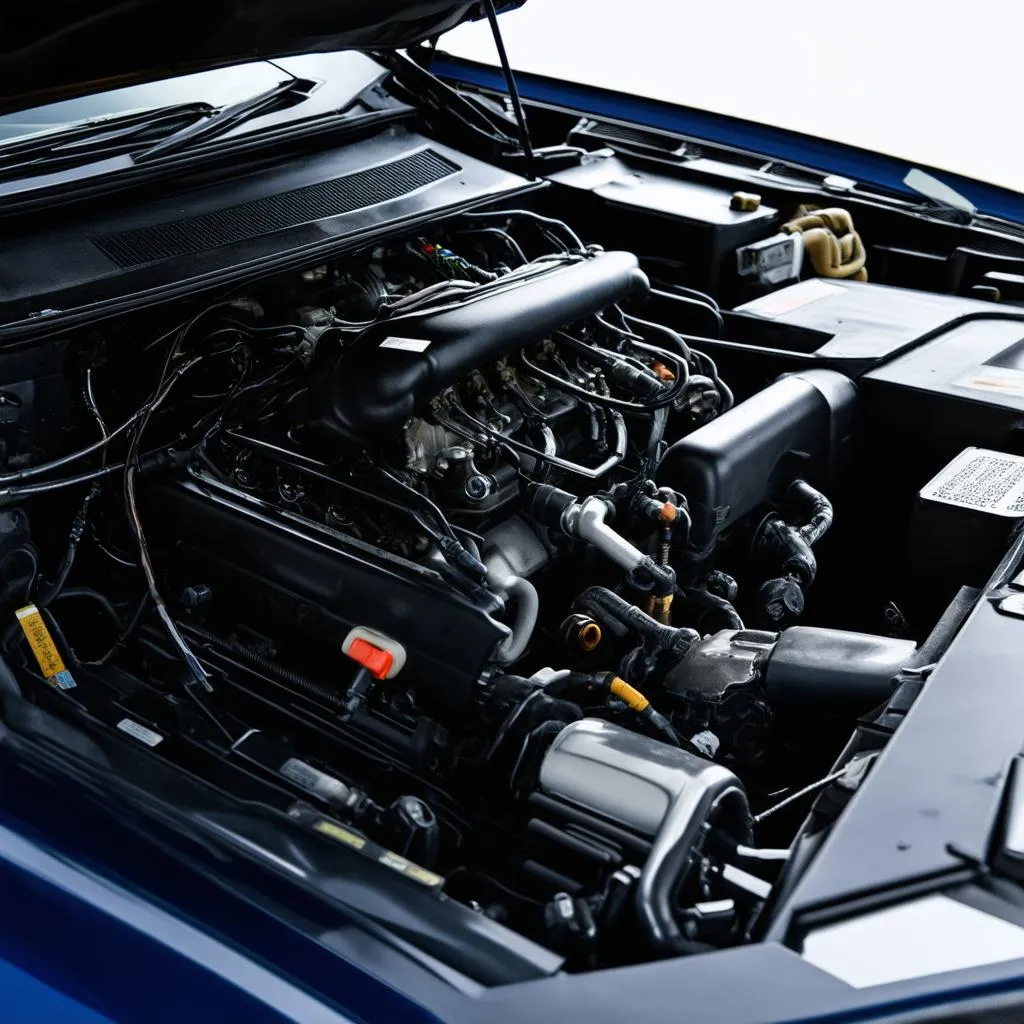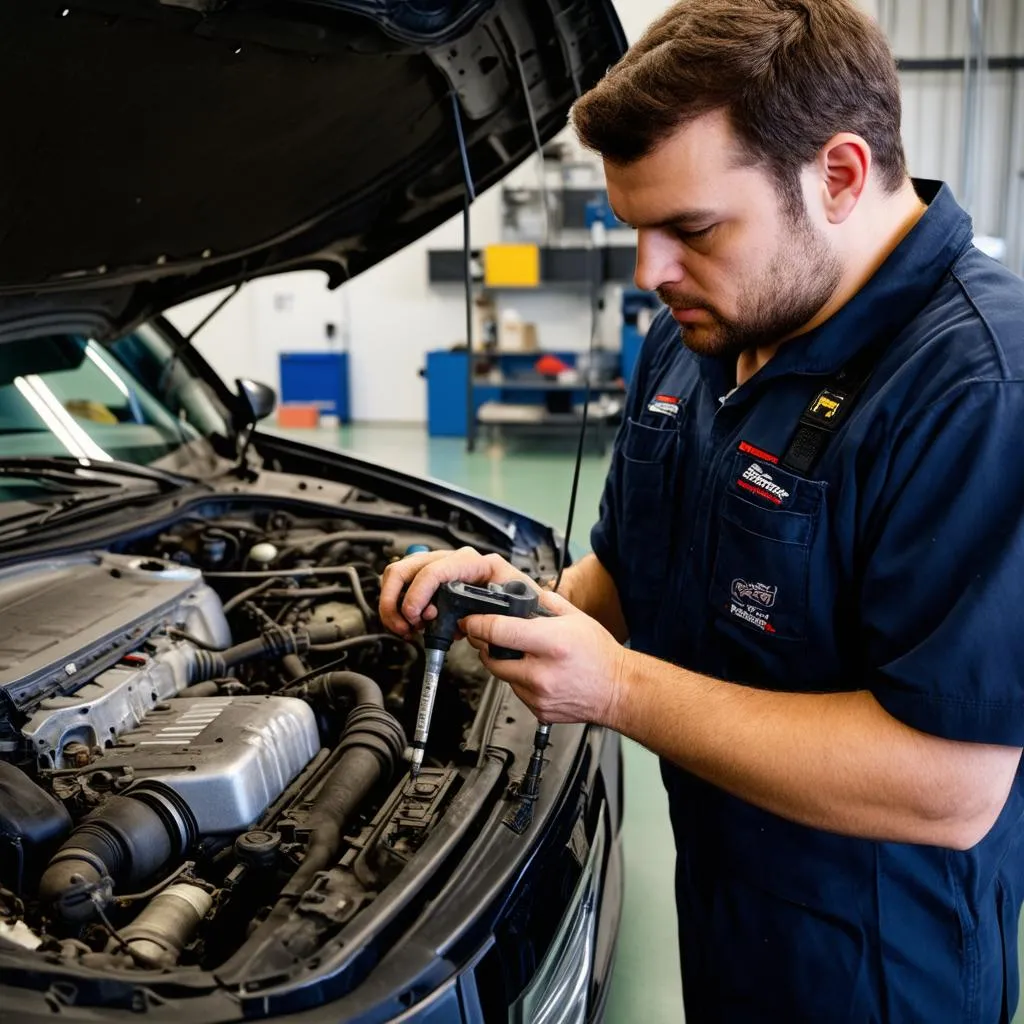Picture this: You’re cruising down the Pacific Coast Highway in your trusty 2005 Subaru Legacy, the wind in your hair, and the sun on your face. Suddenly, that dreaded check engine light throws a wrench into your blissful drive. You pull over, heart sinking, and reach for your trusty OBD scanner. As you plug it in, a wave of dread washes over you: P0420.
Now, what in the world does that mean? Don’t worry; we’re here to demystify the cryptic world of OBD codes, specifically the infamous P0420, and what it means for your beloved Subaru.
Understanding the Language of Your Car: OBD Code P0420 Explained
The OBD, or On-Board Diagnostics, system in your car is like its own internal mechanic. It constantly monitors various systems, and when it detects an issue, it throws up a code, like our friend P0420. This particular code indicates a potential problem with your catalytic converter system, specifically on Bank 1.
In simple terms, your catalytic converter’s job is to convert harmful pollutants in your car’s exhaust into less harmful substances. When the P0420 code pops up, it usually means the oxygen sensor downstream of the catalytic converter isn’t detecting the expected efficiency level.
Why Should You Care?
Some might be tempted to ignore the check engine light, especially if the car seems to be running fine. However, ignoring a P0420 code can have several consequences:
- Environmental Impact: A malfunctioning catalytic converter means more harmful emissions are released into the atmosphere.
- Performance Issues: You might experience reduced fuel efficiency, sluggish acceleration, or even stalling.
- Costly Repairs: Ignoring the problem can lead to damage to other components, resulting in more extensive (and expensive) repairs down the line.
P0420: Causes, Symptoms, and Solutions
The P0420 code can be triggered by several factors, ranging from simple fixes to more complex issues:
Possible Culprits:
- Faulty Oxygen Sensor: A malfunctioning oxygen sensor (particularly the downstream one) can send incorrect signals to the car’s computer, triggering the P0420 code even if the catalytic converter is working fine.
- Catalytic Converter Issues: A damaged or worn-out catalytic converter is the most common culprit behind the P0420 code.
- Exhaust Leaks: Leaks in your exhaust system can disrupt the oxygen sensor readings and trigger the code.
- Engine Misfires: Unburned fuel from engine misfires can damage the catalytic converter over time, leading to a P0420 code.
Recognizing the Warning Signs:
Apart from the illuminated check engine light, your Subaru Legacy might exhibit some telltale symptoms of a P0420 code:
- Reduced Fuel Economy: You might find yourself making more frequent trips to the gas station.
- Sluggish Performance: The car might feel sluggish, especially during acceleration.
- Failed Emissions Test: A P0420 code will almost certainly result in a failed emissions test.
- Rotten Egg Smell: A strong sulfur smell from the exhaust is a sure sign of a catalytic converter problem.
Fixing the Problem:
Diagnosing and fixing a P0420 code often requires a multi-step approach:
- Read the Code: Start by reading the OBD code using a scanner. This will confirm the P0420 code and rule out other potential issues.
- Inspect the Oxygen Sensors: Check the oxygen sensors (both upstream and downstream) for any damage or signs of wear and tear. Replacing a faulty oxygen sensor is a relatively inexpensive fix.
- Inspect for Exhaust Leaks: Carefully examine your exhaust system for any leaks. Even small leaks can affect sensor readings and trigger the code.
- Check for Engine Misfires: Address any underlying engine issues that might be causing misfires and potentially damaging the catalytic converter.
- Catalytic Converter Replacement: If the catalytic converter is indeed the culprit, it will likely need to be replaced. This is a more expensive repair, so it’s essential to confirm the diagnosis before shelling out the big bucks.
Expert Insight: According to automotive engineer Dr. Emily Carter, author of “The Complete Guide to Automotive Diagnostics,” “While a P0420 code often points towards a faulty catalytic converter, it’s crucial to rule out other possibilities like faulty oxygen sensors or exhaust leaks before resorting to a costly replacement.”
Beyond the Technical: The P0420 Code and Your Subaru’s “Chi”
In many cultures, cars are seen as more than just machines; they’re companions, extensions of our personalities, and even possess a certain “energy” or “chi.” Addressing a P0420 code can be seen as restoring balance and harmony to your Subaru’s system, ensuring it runs smoothly and efficiently for years to come.
 Car Engine
Car Engine
Frequently Asked Questions about the P0420 Code:
Q: Can I still drive my car with a P0420 code?
A: While you might be able to drive for a short period, ignoring the code can lead to more severe problems and costlier repairs down the line. It’s best to address the issue as soon as possible.
Q: How much does it cost to fix a P0420 code?
A: The cost can vary depending on the underlying cause and whether you choose to DIY or go to a mechanic. Replacing a faulty oxygen sensor is generally cheaper than replacing the entire catalytic converter.
Q: Can a bad catalytic converter damage my engine?
A: While a bad catalytic converter won’t directly damage your engine, it can lead to performance issues and potentially damage other components in the exhaust system over time.
 Car Mechanic at Work
Car Mechanic at Work
Exploring Related Issues:
- P0421: Catalyst System Efficiency Below Threshold (Bank 1)
- P0135: O2 Sensor Heater Circuit Malfunction (Bank 1, Sensor 1)
- P0139: O2 Sensor Circuit Slow Response (Bank 1, Sensor 2)
Supported Car Makes for Diagnostics Tool:
Our diagnostics tools and expertise extend to a wide range of car makes, including Subaru, Toyota, Honda, Nissan, and many more.
Need Help? We’re Just a Message Away!
Decoding cryptic OBD codes can be frustrating, but you don’t have to face it alone. At TechCarUSA, we’re dedicated to helping you understand and resolve your car troubles. If you’re struggling with a P0420 code or any other automotive issue, don’t hesitate to reach out to our team of experts via WhatsApp at +84767531508. We’re here to help you get back on the road and enjoy the freedom of the open highway!
Keep Exploring TechCarUSA:
For more insightful articles on car maintenance, troubleshooting, and everything automotive, explore our website, TechCarUSA.com. You’ll find a wealth of information to empower you as a car owner.
